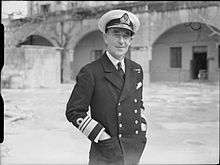Ralph Leatham
| Sir Ralph Leatham | |
|---|---|
 Leatham on his appointment as Vice Admiral Malta | |
| Born |
3 March 1888 Hemsworth, West Yorkshire |
| Died | 10 March 1954 (aged 66) |
| Allegiance |
|
| Service/branch |
|
| Years of service | 1900–1946 |
| Rank | Admiral |
| Commands held |
HMS Yarmouth HMS Durban HMS Ramillies HMS Valiant Commander-in-Chief, East Indies Station Commander-in-Chief, Levant Plymouth Command |
| Battles/wars |
World War I World War II |
| Awards | Knight Commander of the Order of the Bath |
Admiral Sir Ralph Leatham KCB (3 March 1888 – 10 March 1954) was a Royal Navy officer who served as Commander-in-Chief, Plymouth during World War II.
Naval career
Leatham joined the Royal Navy in 1900 as a cadet on the training ship Britannia.[1] He served on various ships during World War I.[2] After the War he went on to command HMS Yarmouth, HMS Durban, HMS Ramillies and HMS Valiant.[1] He was appointed Commander of the 1st Battle Squadron in 1938.[1]
He served in World War II as Commander-in-Chief, East Indies Station from April 1939 and as Flag Officer in Command, Malta from 1941 taking part in actions against the Italian Navy.[2] He became Deputy Governor of Malta in 1943 and was briefly temporary Commander-in-Chief, Levant before becoming Commander-in-Chief, Plymouth later in 1943.[1] He retired in 1946.[1]
In retirement he became Governor of Bermuda.[1]
Family
In 1910 he married Enid Birks; they had one son and one daughter.[3]
References
External links
| Wikimedia Commons has media related to Ralph Leatham. |
| Military offices | ||
|---|---|---|
| Preceded by Sir James Somerville |
Commander-in-Chief, East Indies Station 1939–1941 |
Succeeded by Post Disbanded (became Eastern Fleet) |
| Preceded by Sir Wilbraham Ford |
Flag Officer, Malta 1941–1942 |
Succeeded by Sir Stuart Bonham Carter |
| Preceded by Sir Charles Forbes |
Commander-in-Chief, Plymouth 1943–1945 |
Succeeded by Sir Henry Pridham-Wippell |
| Government offices | ||
| Preceded by Lord Burghley |
Governor of Bermuda 1946–1949 |
Succeeded by Sir Alexander Hood |